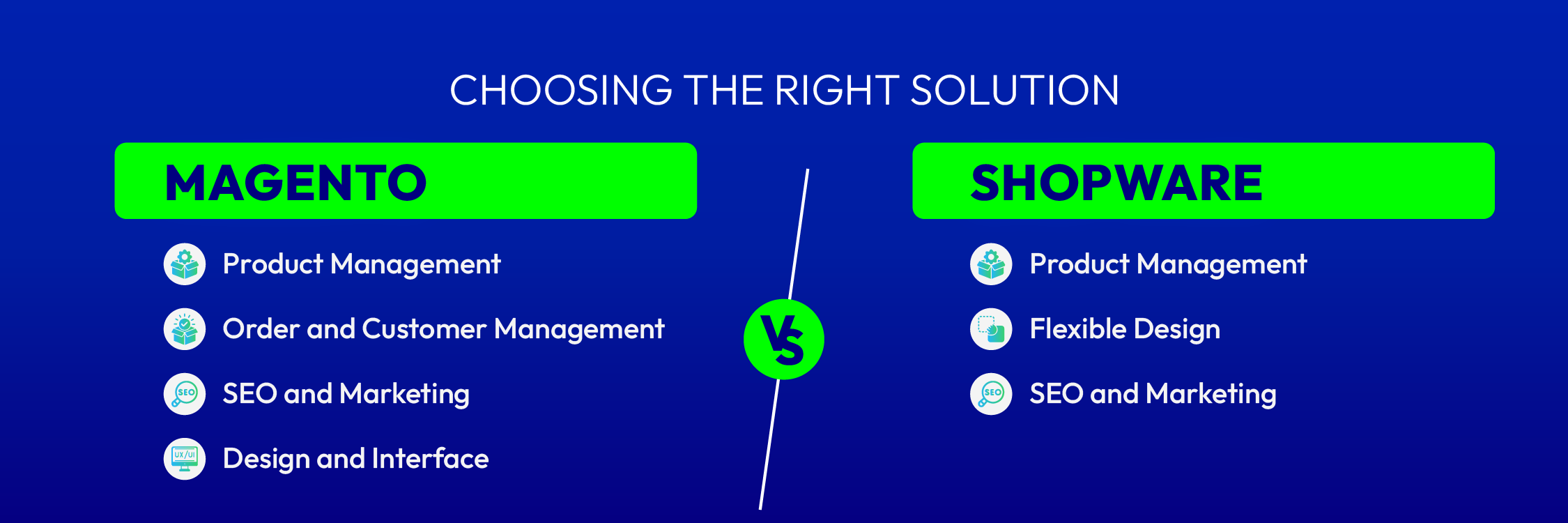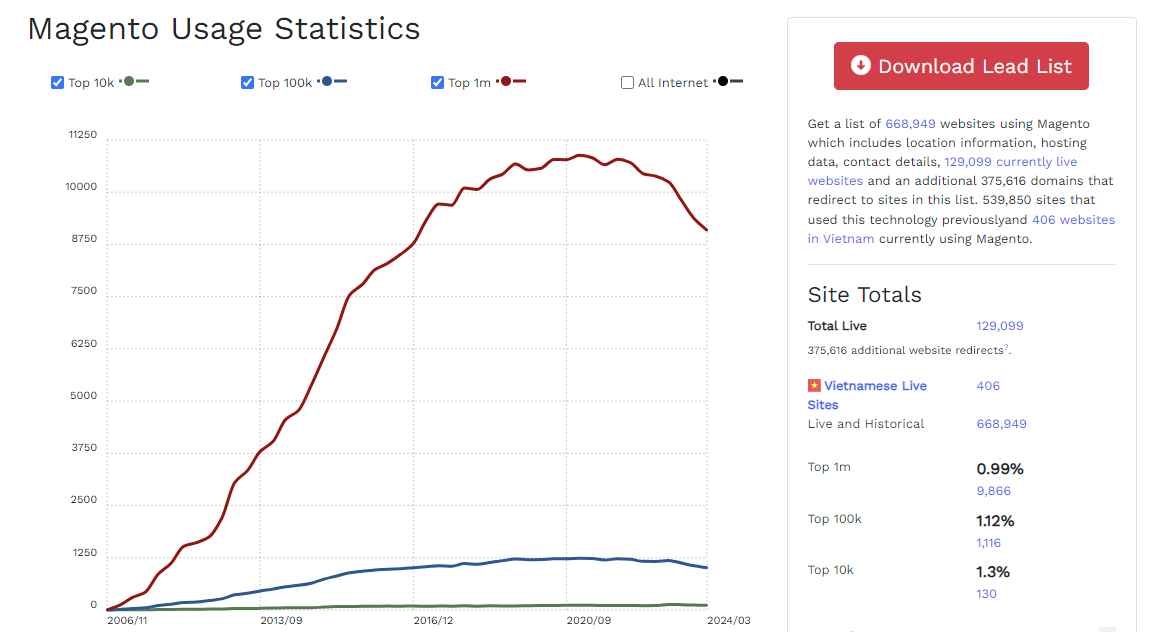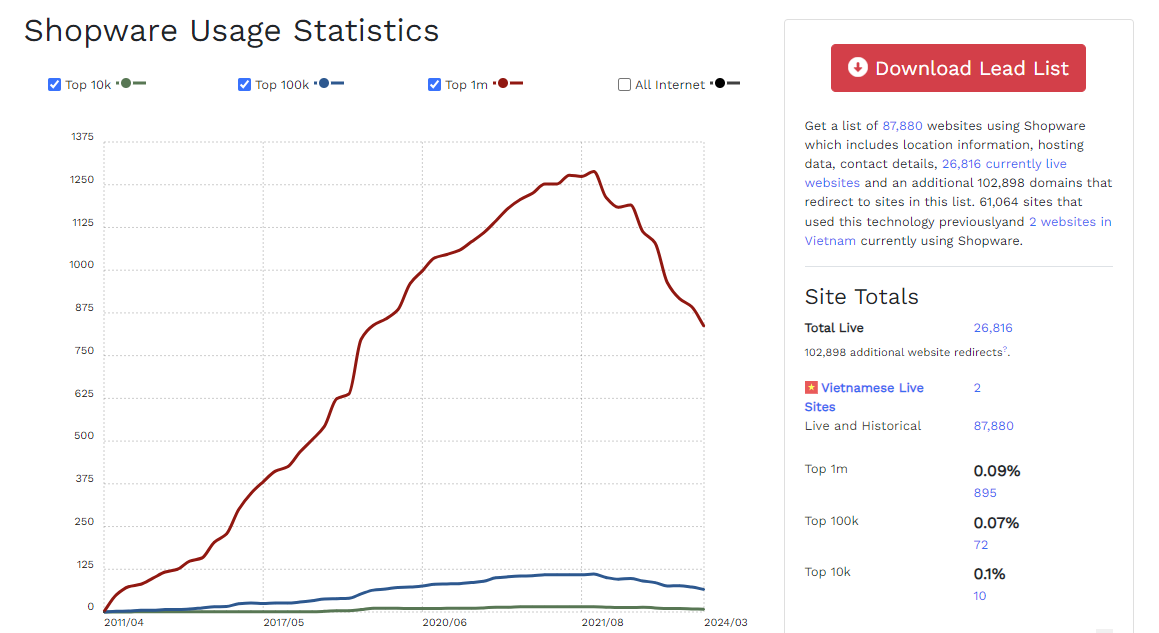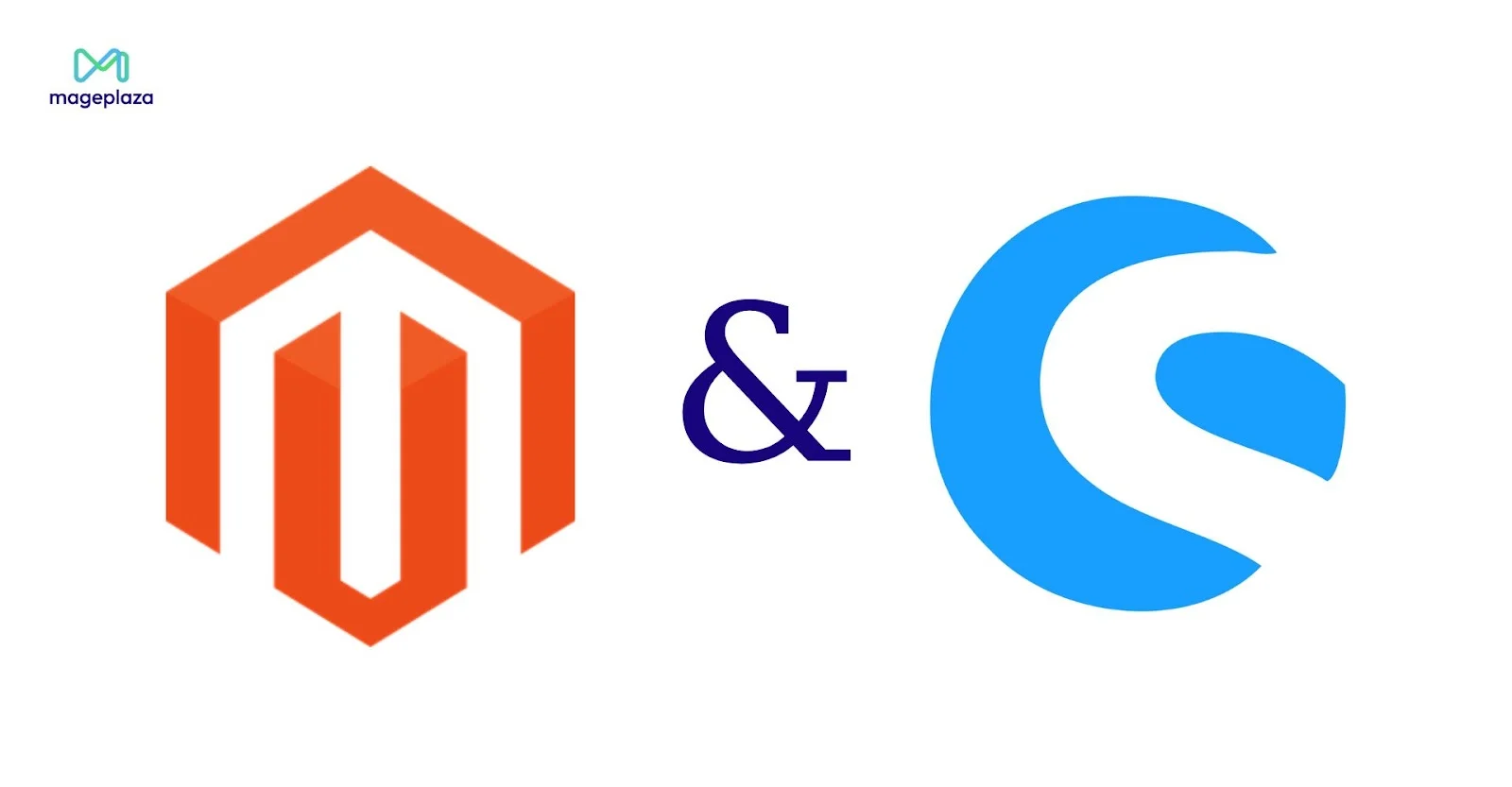How to implement Cookie Consent for GTM & Google Analytics in Magento Under GDPR?
Implement cookie consent for GTM & GA4 in Magento under GDPR. Step-by-step guide using Google Consent Mode v2 to avoid fines and maintain analytics.

When embarking on building an online store, you’re likely faced with decisions on selecting the right platform that suits your business needs. Choosing the appropriate platform directly impacts business efficiency and long-term growth.
Magento and Shopware are two of the leading platforms chosen by many businesses due to their flexibility, scalability, and robust features they offer.
To facilitate differentiation and help you make an informed choice, we’ll provide an overview of Magento and Shopware, compare their similarities and differences, and offer detailed evaluations to assist you in selecting the most suitable solution for your business.

Magento was first launched in 2008 as an open-source e-commerce platform developed by Varien Inc., now owned by Adobe. It is renowned for its flexibility, high customization capabilities, and a large and robust development community.
According to Builtwith, as of 2025, Magento has achieved milestones such as:
9th most popular on the Entire Internet in Open Source category.
4th most popular in the Top 1 Million sites in Open Source category.
12th most popular on the Entire Internet in eCommerce category.
129,099 live websites using Magento

Magento offers two main editions: Magento Open Source (free) and Magento Commerce (paid). With versions Magento 1 and Magento 2, the platform has continuously evolved and updated to meet increasing user demands.
Magento features a rich Marketplace with thousands of extensions, allowing you to expand your store’s functionality with additional utilities such as payment, shipping, and marketing. It additionally facilitates connectivity with diverse systems such as CRM, ERP, and external services, streamlining the effective administration of your complete business operations.
Even with high traffic, Magento ensures high performance for smooth store operations, as well as protecting you and your customers’ data by providing advanced security features.
Magento boasts prominent features such as:
Product Management: Magento provides powerful product management tools, making it easy to manage product catalogs, product attributes, and variations.
Order and Customer Management: Advanced tools for order and customer management help you efficiently track and process orders.
SEO and Marketing: Magento integrates built-in SEO and marketing tools to optimize content and marketing strategies, attracting and retaining customers.
Design and Interface: With flexible customization capabilities, Magento allows you to create a signature online store that aligns with your brand.

Shopware, established in 2000, is an open-source e-commerce platform developed in Germany, renowned for its high customizability and strong developer community. Shopware offers various editions such as the free Shopware Community Edition and the paid Shopware Enterprise.
According to Builtwith, as of 2025, Shopware has achieved milestones such as:
11th most popular on the Entire Internet in Enterprise category.
19th most popular in the Top 1 Million sites in Open Source category.
20th most popular in the Top 1 Million sites in eCommerce category.
26,816 live websites using Shopware

With a focus on user experience and scalability, Shopware has become a preferred choice for businesses of all sizes globally. It boasts a rich plugin store, allowing users to extend store functionality with additional features like payment gateways, shipping options, and marketing tools. The platform supports integration with various systems such as CRM, ERP, and third-party services, facilitating efficient business process management.
Similar to Magento, Shopware is designed for high performance, ensuring smooth operation even under heavy traffic. It also provides security measures to protect your data and customers from potential threats.
Key features of Shopware include:
Product Management: Powerful tools for managing product categories, variants, and options.
Flexible Design: Intuitive drag-and-drop interface for easy storefront customization without deep programming knowledge.
SEO and Marketing: Built-in SEO and marketing tools to optimize content and marketing strategies for customer attraction and retention.
When comparing Magento and Shopware, these two e-commerce platforms share several key similarities that users should consider:
1. Open Source Model: Both Magento and Shopware offer open-source versions, allowing users to customize and develop according to their specific needs.
2. Rich Feature Set: Both platforms provide features for product management, order management, customer management, as well as marketing and SEO tools to support online business strategies.
3. Multilingual and Multichannel Support: Magento and Shopware both support multiple languages and multiple sales channels, enabling users to expand their markets and reach global customers.
4. Community and Support: Both platforms have strong developer communities and provide documentation, training courses, and technical support to help users grasp and effectively utilize platform features.
5. Integration and Scalability: Magento and Shopware each have rich marketplaces, offering extensions and integrations with third-party systems to extend store functionalities.
6. Performance Optimization: Both platforms focus on optimizing store performance, ensuring smooth and stable operation even under high traffic conditions.
7. Security and Compliance: Magento and Shopware both provide advanced security features and comply with regulations regarding data security and customer protection.
These similarities highlight the robust capabilities of Magento and Shopware in supporting diverse e-commerce needs, making them viable choices for building and managing online stores.
When comparing Magento and Shopware, there are significant differences that users should consider when choosing the most suitable ecommerce platform for their needs:
Magento
Architecture: Magento is built on PHP and employs a modular architecture, allowing separation of different parts of the system for flexibility in development and scalability.
Technology: Magento uses popular technologies like PHP, MySQL, and Apache/Nginx. It supports various types of databases, optimizing platform performance and scalability.
Shopware:
Architecture: Shopware 6 is developed on the Symfony Framework and utilizes an API-first and microservices model. This enables partitioning system components into smaller services, enhancing performance and ease of management.
Technology: With Symfony Framework as its core, Shopware 6 also incorporates modern technologies such as Vue.js for user interfaces, providing a better end-user experience and supporting advanced web applications.
Magento:
Market Segment: Magento primarily suits large and complex businesses needing integration of multiple stores (multi-store) and management of extensive product catalogs.
High Customization: Magento offers powerful customization capabilities, allowing businesses to adjust and expand functionality according to specific requirements, from user interfaces to back-end systems.
Multi-store Management: Supports managing multiple stores from a single admin interface, saving time and optimizing operational workflows.
Shopware:
Market Segment: Shopware is often chosen by small to medium-sized businesses, focusing on user experience and personalization.
API-first and Microservices Solution: Shopware 6 utilizes an API-first and microservices approach, optimizing performance and flexibility in integrating with external systems.
User Experience: Characterized by user-friendly interfaces and strong personalization capabilities, enhancing interaction and conversion rates.
Magento:
Extensions: Magento boasts a robust and large development community, offering over 5000 diverse extensions. These range from basic features like payment and shipping to advanced functionalities such as warehouse management, CRM integration, and marketing solutions.
Plugin Library: Magento Marketplace is the primary hub for searching and downloading plugins. Users can find a rich array of solutions to flexibly and easily extend ecommerce store functionality.
Shopware:
Extensions: Shopware also has a rapidly growing development community, though the number and diversity of extensions are not yet at Magento’s level. However, Shopware 6 supports advanced features like brand identity integration, ERP integration, and warehouse management solutions.
Plugin Library: Plugins and extension features in Shopware often focus on optimizing user experience and personalization. Marketing tools and integration with other management systems are also developed to provide comprehensive solutions for small and medium-sized enterprises.
Magento
Product and Order Management: Magento provides a robust product management system that allows businesses to manage thousands of products simultaneously. This includes managing product categories, attributes, variations, and inventory.
Payment and Shipping Integration: Magento supports integration with multiple payment gateways and international shipping services, making online shopping easier and more convenient for end users.
SEO and Marketing: Magento offers powerful SEO tools such as URL optimization, meta tags, star ratings in search results, enhancing businesses’ search engine rankings. Additionally, Magento integrates marketing strategies such as discounts, coupon codes, and advertising campaigns.
Multi-language and Multi-store: Magento supports multi-language and multi-store management from a single admin interface, enabling businesses to expand their operations without language or geographical barriers.
Shopware
Optimized User Experience: Shopware focuses on improving user experience, from user interface to product management and checkout. The platform designs user-friendly interfaces that are easy to use and optimized to enhance interaction and conversions.
CRM and ERP Integration: Shopware integrates with CRM and ERP solutions, helping businesses better manage operations and customer interactions.
Marketing and Personalization: Shopware provides advanced marketing tools, including campaign management, email marketing, and integration with marketing strategy calculation tools.
Community and Support: Shopware has a vibrant user community and extensive support documentation, making it easy for businesses to access information and resolve issues during deployment and platform usage.
Magento
Server Configuration Requirements: Magento requires more powerful server configurations compared to Shopware to ensure smooth operation, especially when handling large amounts of data and multiple simultaneous users.
Caching and Database Optimization: Using caching and database optimization solutions is essential to minimize response times and increase page load speeds.
Content Delivery Network (CDN): Magento supports integration with CDN services to optimize content delivery and reduce minimize page load times for users located in various regions, improving user experience and reducing server load.
Image Optimization: Magento offers image optimization tools to decrease file sizes and improve page loading times by using smaller image formats while maintaining image quality.
Cloud Solutions: Magento Cloud offers efficient development, deployment, and management environments, reducing system load and optimizing operational costs.
Shopware
Microservices Architecture: Shopware 6 uses a microservices model, enhancing scalability and performance by separating system functions into independent services.
API-first Approach: Shopware focuses on an API-first model, facilitating seamless integration with third-party platforms and external applications, improving flexibility and interaction capabilities within an extended ecosystem.
Database Optimization: Shopware employs database optimization techniques to reduce query response times and improve performance when processing large volumes of data.
Cloud Technology and Docker: Shopware supports deployment on cloud platforms and Docker, making it easy to manage and optimize system infrastructure.
Magento
Magento is known for its powerful SEO and marketing tools, suitable for businesses looking to enhance their e-commerce websites for better search engine visibility and expand their customer base.
SEO Friendly: Magento offers numerous features to optimize SEO such as URL optimization, meta tags, header tags, and automatic XML sitemaps, enhancing SEO rankings and attracting more users from search engines like Google.
Marketing Automation: Magento integrates automated marketing tools such as email marketing, Google AdWords advertising, and promotions and discounts programs, attracting and retaining customers through effective marketing strategies.
Analytics and Reporting: Magento provides detailed analytics and reporting tools on website activities, assisting users in comprehending customer actions and the impact of marketing efforts.
Easy Integration: Magento allows integration with external marketing tools like Google Analytics, Mailchimp, and other advertising platforms to enhance tracking capabilities and optimize marketing strategies.
Shopware
Shopware also offers effective SEO and marketing tools, with some differences compared to Magento:
User Experience Focus: Shopware focuses on improving user experience, which can enhance SEO due to increased page retention time and reduced bounce rates.
Research-based Marketing Tools: Shopware provides marketing tools based on market research and current consumer trends, simplifying the process for businesses to recognize and connect with their intended audience.
Integration with Leading E-commerce Platforms: Shopware integrates well with platforms like Amazon and eBay, expanding user reach and enhancing multi-channel marketing strategies.
Multi-channel Tools and Navigation: Shopware 6 supports an API-first model and microservices, making it easier to integrate and manage marketing campaigns across multiple channels.

Advantages:
Powerful and Flexible: Magento is a robust platform that offers extensive features and customization options for developing complex ecommerce stores.
Feature-rich: Magento provides comprehensive features for product management, order processing, payments, and analytics reporting, enabling efficient store management.
Large Support Community: Magento has a large development and support community, with numerous additional extensions and plugins that extend functionality and enhance user experience.
Good SEO Optimization: Magento offers powerful SEO optimization tools, such as URL optimization, meta tags, and sitemap, making it easy for stores to be discovered on search engines.
Disadvantages:
Complexity and System Resource Requirements: Magento requires a powerful server system to operate smoothly, and handling installation and maintenance may pose greater complexity relative to other platforms.
High Costs: Implementing and maintaining Magento can involve significant investment costs, especially for small and medium-sized enterprises.
Advantages:
Good user experience: Shopware focuses on improving user experience with a user-friendly and intuitive interface.
Multi-channel and easy integration: Shopware supports an API-first and microservices architecture, facilitating efficient integration and management of diverse sales channels.
Strong community and support: Shopware has a dynamic user and developer community, along with rich support documentation and training resources.
Effective marketing and SEO: Shopware provides market research-based marketing tools to optimize marketing and SEO strategies.
Disadvantages:
Feature limitations compared to Magento: Despite its strong development, Shopware may be limited in features and customization compared to Magento.
Integration and expansion costs: Integrating features and expanding Shopware functionalities may incur higher costs compared to other e-commerce platforms.
Choosing between Magento and Shopware depends on the specific needs of each business.
Magento is ideal for large and complex enterprises that require high flexibility and scalability. It offers endless customization options, making it perfect for businesses looking to build powerful and feature-rich online stores. Explore our Magento Development services to see how we can help you create a robust eCommerce platform tailored to your needs.
On the other hand, Shopware is a great choice for small to medium-sized businesses focused on user experience and personalization. It provides strong marketing tools and seamless integration with business management solutions.
Consider these factors carefully and select the best ecommerce platform for your business. If you encounter challenges during the decision-making process, don’t hesitate to contact experts for advice and additional support.
Wishing you success!